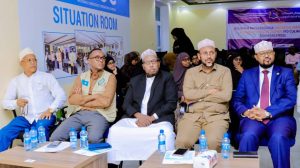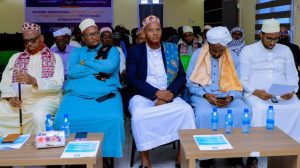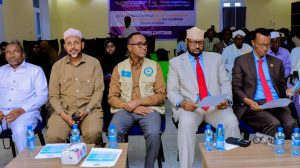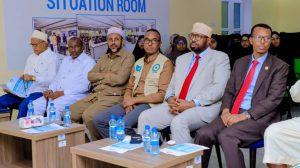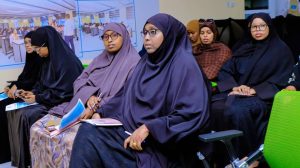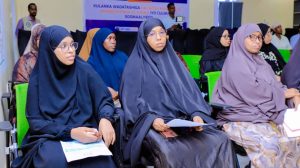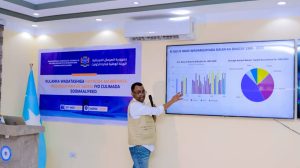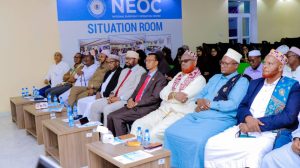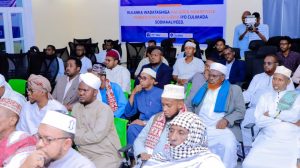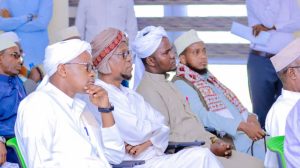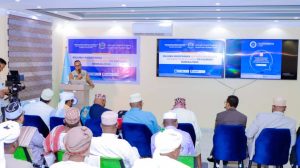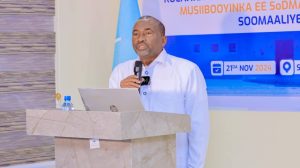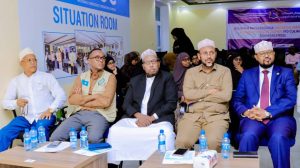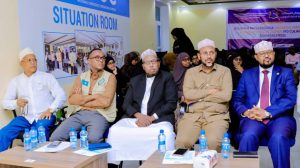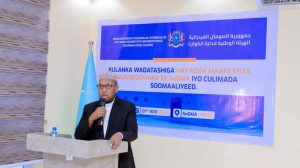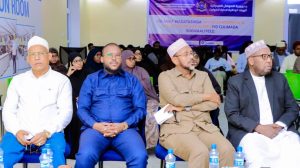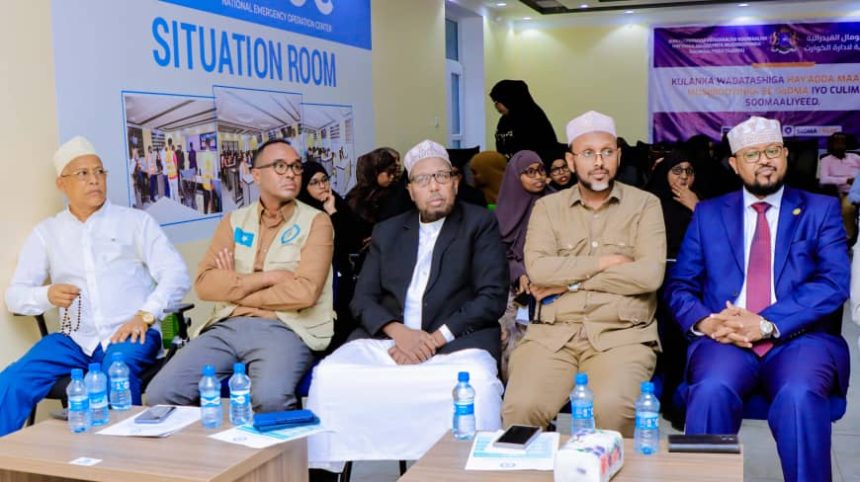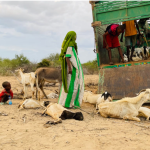Mogadishu, Somalia – November 21, 2024 – The Somali Disaster Management Authority (SoDMA) convened today with Somali religious leaders for a consultative meeting aimed at strengthening collaboration and enhancing disaster preparedness and response across the country.
The event, attended by the Commissioner of SoDMA, Mr. Mohamud Ma’alin, the Chair of the Parliamentary Committee on Justice and Religious Affairs, members of Parliament, religious leaders, and members of the public, marked a significant milestone in fostering transparency and community involvement in disaster management.
Mr. Ma’alin opened the meeting by emphasizing the importance of engaging religious scholars and the community in SoDMA’s decision-making processes. He highlighted that since its inception in 2022, SoDMA has consistently valued the insights of religious scholars. Mr. Ma’alin also addressed the current vulnerabilities caused by the extremist group Al-Shabaab, which has disrupted farming and displaced hundreds of thousands, exacerbating the humanitarian crisis.
Parliament member Abdirahman commended SoDMA’s efforts, noting the significant benefits that have accrued to the population since the agency’s re-establishment two years ago. He stressed the importance of providing security as a prerequisite to effective humanitarian assistance.
Ali Hagi Dahir, Chair of the Justice and Religious Affairs Committee, emphasized Somalia’s rich agricultural potential and urged religious leaders to raise awareness about farming. He called on SoDMA to facilitate agricultural activities to enhance self-sufficiency.
Prominent religious leader Sheikh Ali Wajis reinforced the need for humanitarian efforts, suggesting the imposition of a 2% salary contribution for such causes. He proposed that business communities should also pledge regular contributions and recommended that the President be accompanied by humanitarian teams, led by SoDMA, during official visits. Sheikh Wajis also advocated for relocating IDP camps from the capital to allow displaced individuals to return home.
Faduma Adle, Chair of Somali Women Religious Scholars, advocated for the integration of religious leaders into SoDMA’s framework, suggesting the establishment of a dedicated department for them.
Key Outcomes of the Meeting:
- Public Awareness Campaigns: Scholars will actively participate in educational campaigns to raise awareness about risk reduction measures and promote self-reliance during potential disasters.
- Integration of Islamic Principles: Islamic principles will be integrated into disaster risk management policies, with religious leaders addressing these topics during Friday prayers, community meetings, and religious events.
- Promotion of Islamic Charitable Values: Encouraging the practice of Zakat and other forms of community support to foster social cohesion and collective resilience.
- Knowledge and Skills Enhancement: Improving scholars’ knowledge and skills in disaster risk reduction and emergency response.
- Environmental Protection Discussions: Promoting discussions on the relationship between Islamic principles and environmental protection to reduce disaster risks.
- Inclusive Approach: Adopting an inclusive approach to disaster risk management that addresses the needs of women, children, and individuals with disabilities.
- Oversight and Accountability: Enhancing oversight and accountability of humanitarian organizations by establishing robust mechanisms to monitor emergency response activities and disaster resilience projects.
- Inter-institutional Coordination: Improving consultations and coordination among various institutions involved in emergency response and disaster risk reduction, including Somali scholars.
- Reduction of Foreign Aid Dependence: Establishing policies to reduce long-term reliance on foreign aid by developing economic infrastructure and strategies to enhance community resilience and self-sufficiency.
The meeting highlighted the critical role of religious leaders in mitigating disaster risks, promoting resilience, and fostering a self-reliant society. Scholars praised SoDMA’s preventive actions and its commitment to minimizing the impact of disasters in Somalia. They unanimously welcomed SoDMA’s plans and urged the Somali public to take greater responsibility and support vulnerable populations.
The conference concluded with a collective commitment to strengthening community resilience and ensuring a secure future for the Somali people. Participants recognized the importance of fostering strong connections and collaborating on community awareness programs focused on risk prevention and disaster response.
